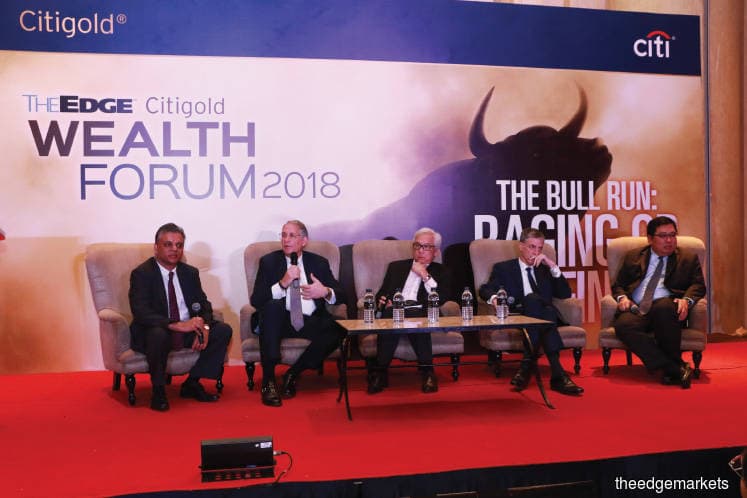
This article first appeared in The Edge Financial Daily on March 19, 2018
KUALA LUMPUR: Investment opportunities amid the ongoing volatility on Bursa Malaysia took centre stage at The Edge Citigold Wealth Forum 2018 held on Saturday.
At the half-day forum entitled “The Bull Run: Raging or Ageing?” attended by more than 500 participants, Teng Chee Wai, managing director of Affin Hwang Asset Management Bhd, pointed out the recent selldown on Bursa Malaysia was driven by sentiment rather than fundamentals as Malaysia prepares to face the impending 14th general election. As such, this presents plenty of opportunities to scoop up oversold shares.
Responding to a question of whether investors should observe a wait-and-hold approach or dive in to buy stocks during the panel discussion, Teng stressed: “For those that want to dip their toes into the market in this current environment, they should do so selectively.”
He advised investors to be on the lookout for company earnings when selecting stocks. He pointed out that companies in the financial sector are delivering good earnings growth, which is driving a lot of interest in banking stocks.
“Glove companies in Malaysia are also benefiting from a closure of [some vinyl glove] factories in China, and we’re seeing good earnings numbers there too as a result. For instance, Top Glove [Corp Bhd] just reported that its quarterly numbers are up by more than 30%.
“However, certain exporters aren’t doing very well, for example, due to the slowdown in sales of Apple’s iPhone X. Right now, unless you’ve invested in these very narrow sectors, you’re not going to see too many benefits,” he said during his “Brace for Turbulence — Positioning Ourselves for the Long-Haul Malaysia” presentation.
According to most analysts, the outlook for the looming public polls — which constitution dictates it must be held before August as the mandate of the Barisan Nasional-led government expires on June 24 — looks promising for the administration led by Prime Minister Datuk Seri Najib Razak.
“Some stocks do have some good value, while some of exporters did sell off quite significantly … I think we are seeing a fair bit of some value coming through in some of these companies, and we are happy to leverage on it,” he said.
Concerns on the local front aside, Jai Tiwari, the head of foreign exchange strategy and regional wealth advisory at Citibank Singapore Ltd, assuaged investors’ nerves saying that risky assets are well supported by a global synchronised growth.
The key risks are surges in the US interest rate and possibilities of trade war initiated by US President Donald Trump, he said. Nevertheless, the chances of these two events transpiring are relatively low.
Tiwari said the US inflation rate is gradually rising despite a tightening labour market. “Yes, the labour market is firming, and wages are picking up, but we have not seen that translating into higher prices [of goods and services] and [a spike in] inflation.”
The weakening US dollar, Tiwari explained, is due to tightening policies undertaken by the European Central Bank and the Bank of Japan, on the back of stronger domestic and regional growth.
On trade war, Tiwari said the tariffs imposed by Trump’s administration target specific products and countries, which limit their impact across global markets. The response from China has also been muted.
“It is a risk that we are monitoring. But it’s not a big one,” he said during his presentation entitled “Navigating a Maturing Bull Market”.
Steven Moeller, managing director and head of multi-asset platform strategist for Asia-Pacific at BlackRock, cautioned investors to expect lower returns and higher volatility in the coming months.
Moeller, who is based in Hong Kong, said investors have done well in the last five years. Not only have global equities rallied, but investment-grade and high-yield bonds, in general, have reaped 4% and 7% annualised returns respectively.
He added that 2017 saw volatility at a historical low. “The US stock market last year experienced a maximum drawdown of 2.8%, which had not happened since 1995.”
Based on the firm’s forecast, the returns on global equities in the next five years are expected to trend down to about 6% to 7%, while fixed income will return about 2% to 3%.
Market volatility is expected to peak again as global inflation rates pick up and geopolitical risks such as the US and North Korean tension and a possibility of trade war between the US and China continue to simmer.
Moeller, in his presentation “Multi-asset investing in today’s markets”, said investors should invest in multi-asset funds to reduce volatility while achieving desired returns. “Historical results show that a multi-asset strategy can help investors generate higher returns with lower volatility and minimal drawdown.”
One area that investors should not be ignoring is technology. Jonathan Curtis, portfolio manager with the Franklin Equity Group at Franklin Templeton Investments, said that there still are plenty of opportunities to be explored in the sector in his presentation entitled “Riding the tech wave”.
Owing to the increased reliance on cloud-based storage systems and their ability to hold huge amounts of data, tech companies are able to utilise artificial intelligence to generate all-new insights into their customers.
Curtis, who is based in California, said that tech companies are enjoying significant amounts of profitability relative to other sectors of the US economy. Earnings growth in the sector has been very encouraging, and according to him, has been accelerating over the last couple of years. As a result, tech companies are making up an increasing percentage of earnings within the S&P 500 Index.
“We believe this acceleration is happening because of the overall digital transformation that is taking place. Ultimately, companies are becoming more reliant on these very large tech firms in order to reach their customers, understand who they are and what matters to them,” said Curtis.